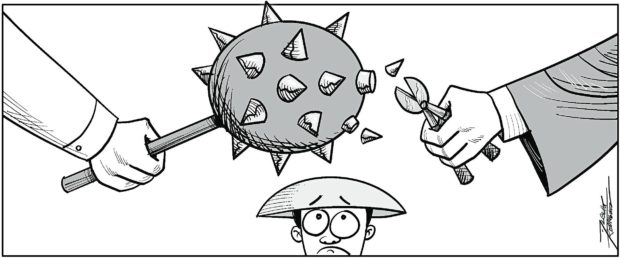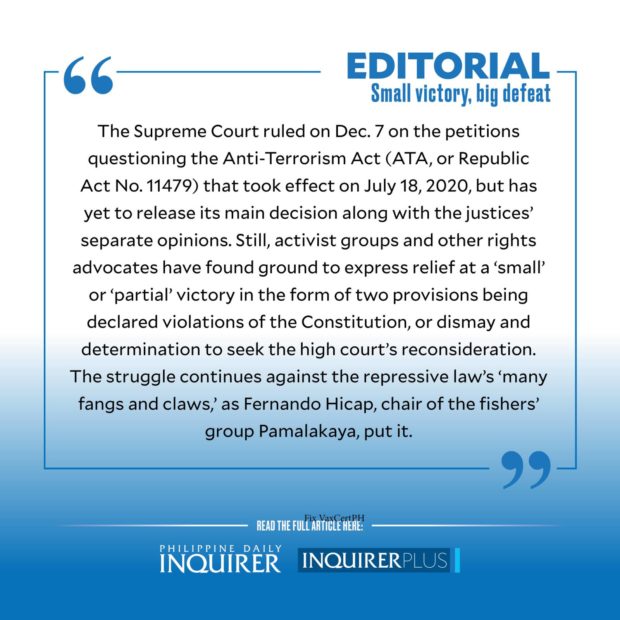Small victory, big defeat

The Supreme Court ruled on Dec. 7 on the petitions questioning the Anti-Terrorism Act (ATA, or Republic Act No. 11479) that took effect on July 18, 2020, but has yet to release its main decision along with the justices’ separate opinions. Still, activist groups and other rights advocates have found ground to express relief at a “small” or “partial” victory in the form of two provisions being declared violations of the Constitution, or dismay and determination to seek the high court’s reconsideration.
The petitions — 37 in all, said to be a record number of appeals involving a single case — reflect the widespread apprehension that greeted the controversial law. The apprehension was not wiped out even if: 1) the justices, voting 12-3, declared as “overbroad and violative of the freedom of expression” Section 4 of RA 11479 stating that terrorism “shall not include advocacy, protest, dissent, stoppage of work, industrial or mass action, and other similar exercises of civil and political rights, which are not intended to cause death or serious physical harm to a person, or endanger a person’s life, or create a serious risk to public safety”; and 2) the justices, voting 9-6, threw out Section 25 that allows the Anti-Terrorism Council consisting of Cabinet members to automatically adopt terrorist designations made by foreign governments or entities such as the United Nations Security Council.
Antonio La Viña, dean of the Ateneo School of Government and counsel of Red-tagged indigenous people in their petition, said the justices’ decision on Section 4 “removes the chilling effect” of the ATA on free speech and assembly. “But it is a small victory in what is still a big defeat for human rights,” he said.
That big defeat consists of other provisions of the ATA that were upheld by the Supreme Court as “not unconstitutional,” including those pertaining to warrantless arrests and prolonged detention of up to 24 days without charges or a court order, and even the Anti-Terrorism Council’s authority to designate foreign or domestic groups and persons as terrorists and to freeze their assets. These are “perilous provisions,” as Edre Olalia, president of the National Union of Peoples’ Lawyers (NUPL) and counsel for petitioners Bayan et al., termed them. Evalyn Ursua, counsel for petitioners composed of journalists and artists, rued the high court’s “depressing” decision and the “scary future” to which, she said, it would lead.
It’s a grim point to ponder as the Christmas season goes into full swing and the drop in COVID-19 infections pushes lockdown-weary Filipinos to surrender to the blandishments of merrymaking. Despite the Supreme Court’s ruling, much of the ATA remains in effect: As Sonny Matula, labor leader, senatorial aspirant, and counsel for labor petitioners, reminded everyone, “These problematic provisions are contrary to due process, to the right to be secure in persons, houses, papers and effects, [and to] freedom of association, among others, which are protected by fundamental law.”
According to Justice Secretary Menardo Guevarra, nothing is final in view of the expectation that the concerned parties would file motions for the high court’s reconsideration. Nevertheless, he said, the implementing rules and regulations pertinent to the outlawed provisions would automatically be scrubbed. National Security Adviser and Anti-Terrorism Council vice chair Hermogenes Esperon Jr. was pleased that the high court did not deem the law “entirely unconstitutional,” and indeed Interior Secretary Eduardo Año pronounced the rejected provisions as “minimal” and hardly of significance to the law’s implementation.
An occasion for satisfaction among those opposed to the ATA was that the Supreme Court did not dismiss their petitions on mere procedural grounds. Howard Calleja, the first to file a petition against the law, said he and his colleagues were “grateful” that the case was discussed on merits and not dismissed on supposed technicalities. This conceivably clears the path for future legal action on the matter—a point that jibes with the high court’s statement that “on the basis of the current petitions,” the rest of the ATA’s provisions are not unconstitutional. “This certainly leaves the door open for a challenge of constitutionality on applied cases,” FEU Law dean Melencio S. Sta. Maria and professors observed.
To be sure, the Philippine National Police through its chief, Gen. Dionardo Carlos, has assured the public that with the high court’s ruling, the ATA would not be used to crack down on activists and other dissenters. Still, the struggle continues against the repressive law’s “many fangs and claws,” as Fernando Hicap, chair of the fishers’ group Pamalakaya, put it.
Declared the NUPL’s Olalia: “We will not allow the dying of the flickering light of our basic rights.”





















